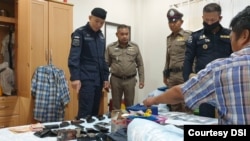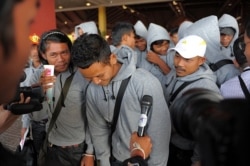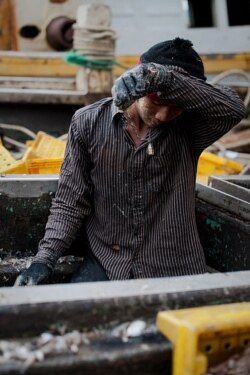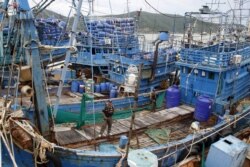Thai police have made the rare arrest of a local politician – along with six other people – on suspicion of trafficking Myanmar migrants onto fishing trawlers and forcing them into debt bondage.
The arrests Tuesday by the federal Department of Special Investigation come as the kingdom tries to clean up complex supply chains in its multibillion-dollar seafood sector.
Thailand’s fishing industry was rocked in 2016 when a Pulitzer-Prize-winning investigation by the Associated Press uncovered slavery and abuse of migrant labor riddling its seafood sector, the seventh largest in the world, supplying tuna, shrimp and pet food to global supermarkets.
The revelations prompted the European Union to threaten a costly ban on fish imports from the country and a consumer awareness campaign that has tarnished the image of made-In-Thailand seafood products.
Thai authorities have scrambled to clean up an industry marked by shadowy brokers, middlemen and influential local figures who dominate its ports and squeeze profit from trafficked, unpaid or debt-bound labor. The EU lifted its threat in 2019.
Dawn raids Tuesday by armed police across Si Chon port in the southern province of Nakhon Si Thammarat on the Gulf of Thailand saw seven people arrested – including a deputy mayor of one of the province’s municipalities and a boat captain.
The detainees are accused of trafficking five Myanmar nationals after allegedly trapping the workers into debt bondage by enticing them onto a boat with an up-front payment that was later reframed as a loan that had to be worked off, police said.
“After they collected the first catch they ripped off the crew,” assistant commissioner-general of Thailand’s police force, Lt-Gen Jaruwat Waisaya, said. “The aim was to sink the workers into a cycle of debt where they have to keep working to pay it off,” he added, without revealing the names of the suspects.
Images shared with VOA show one of the arrested men sitting on his bed alongside several handguns, a sign of the dangers in and around Thailand’s ports where big money is to be made off the backs of cheap labor.
“Don’t think that we don’t know what you’re up to … we will continue to bring criminals to justice so Thailand can be free of human trafficking and this evil of labor exploitation,” Jaruwat warned.
The arrest of a local official, who is alleged to have played an instrumental role in labor abuses at the port stretching back several years, was meant as a warning shot to those whose positions provide them with impunity, a senior police source told VOA.
“We wanted to make an example of a case where a local politician is involved in the crime because the punishment will be harsher than for an ordinary person,” said the source, who requested not to be identified.
If found guilty the politician could face 60 years in jail – three times the normal maximum penalty.
His arrest casts a rare light on the power pyramid governing Thailand’s notoriously shady ports, where activists say multiple layers of kickbacks are paid by dodgy boat operators to hide the identities of crew members, the volume of catches and the true ownership of the vessels. Normally only low-level brokers or boat captains are arrested in cases of abuse and human trafficking.
“It’s a chicken and egg situation,” the police source added. “Are these guys businessmen before becoming politicians or is it really the other way around?”
Catch me if you can
Nakon Si Thammarat, with 225 kilometres of coastline, brought in 115,274 tons of marine catch in 2019, according to Thailand’s Fisheries Department data.
The Southeast Asian country has introduced a series of measures to control an industry staffed mainly by migrants from Myanmar, Cambodia and Laos – all countries sharing porous borders with the kingdom.
Those measures include registration for workers, computer tracking of boats and their catches, and spot checks on captains and crew.
Thailand’s biggest seafood conglomerate is Thai Union, which markets Chicken of the Sea brand tuna. It has worked to root out exploitation in its extensive chain, in part by sourcing its labor directly from Myanmar.
That has won applause from labor rights groups.
“Gaps still remain, but in our experience working with Thai government partners within the criminal justice system, the government is working to improve the system and extend more effective protection to victims,” said Andrew Wasuwongse of International Justice Mission, an NGO whose mission is to end slavery in the seafood industry. It was information from his group that led to Tuesday’s arrests.
The Thai fishing boat lobby says the measures are crushing their profits and heaping the financial burden of stringent labor and environmental standards onto the link in a global fisheries supply chain with the slimmest profit margin - rather than conglomerates, supermarkets and consumers.
In a cat-and-mouse game played out across vast stretches of open seas, unscrupulous boat operators are pushing farther out into the Indian Ocean as fish stocks become depleted in Thai seas. These operators seek to evade detection by swapping flags and crews, repainting vessels and staying at sea for months on end.
“Today’s arrest demonstrates the power of the law can be brought to bear to protect migrant workers in Thailand, who are among the most vulnerable and powerless,” Wasuwongse said. “More so when their employer is a powerful businessman with an official position in the local government.”








